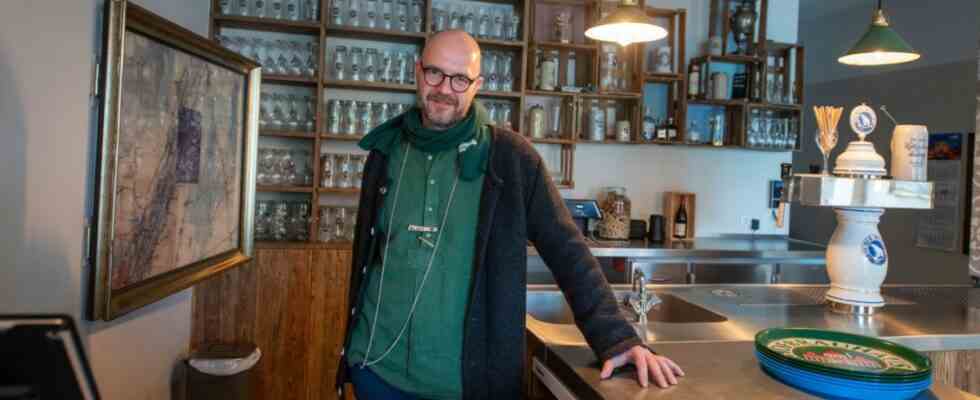“Beer garden open daily”: What you can read on the sign at the Seewirtschaft am Poschinger Weiher in Unterföhring belongs to the past. And not just because the leaves are falling and the migratory birds are heading south to their winter quarters these days. The tavern with its spacious outdoor area is insolvent – and closed. Tenant Stephan Kalis had to close last week, forever. “Regardless of how we twisted and turned it, there is no perspective for continuing,” said the 48-year-old that afternoon, visibly distressed. With the end of the sea economy, his big dream of doing the “most beautiful job there is” as a career changer in gastronomy, namely that of host, also came to naught.
It was not until the end of August 2020 that Kalis and his former wife opened the idyllically located inn on Lake Unterföhring. For many years, the two were regular guests there, but then the chance arose that a new tenant was sought for the restaurant and beer garden. After they signed the lease, they completely rebuilt the entire facility within three months – and unlocked it in the late summer of the first Corona year. And then again at the beginning of November due to the increasing number of infections and incidences. The entire Christmas business was canceled, “this unpredictability” was difficult to endure, Kalis recalls. For seven months, the landlords finally lacked sales, the state Corona aid came only slowly.
Orphaned: After the bankruptcy, the beer garden remains closed.
(Photo: Catherine Hess)
During the closing time, renovation work was carried out in and around the inn, at the beginning of July last year the tenants started the new era with a “kiosk” before the beer garden was able to open. This offered space for more than 700 visitors, inside another 110 guests could be entertained. But apparently not that many wanted to come, according to Kalis, the 3-G and 2-G specifications issued by politicians have probably prevented many people from eating out. “And there were also the unspeakable debates with opponents of the Corona policy, either in the restaurant or on social media.” All very ugly, the failed restaurateur looks back. In the fall he locked the inn again. The “winter kiosk” he devised, where there was mulled wine and small dishes to take away during the cold months, but consumption on site was not allowed, kept the former architect and project manager and new restaurateur Kalis afloat.
The next shock after the pandemic: the war in Ukraine
In 2022 he and his team, which had grown to up to 14 employees at peak times, wanted to get started, in which four refugees from Unterföhring also worked. But no sooner had the pandemic eased than the next shock came: the Russian war of aggression in Ukraine, inflation and the energy crisis. “I’ve always said that gastronomy is a luxury,” says Kalis, describing his mood. Despite all the problems, he could not really have imagined that everything would be over for the maritime economy. Not only has all sorts of negative things come together for him economically in the past, his marriage has also failed, and his ex-wife has left the joint business. Nevertheless, he wanted to continue, after all he had learned a lot from her, who had many years of experience in gastronomy.
There was space for up to 110 guests inside the Seewirtschaft.
(Photo: Catherine Hess)
Kalis reduced the menu, switched to home cooking, relied on extensive use of the ingredients, such as processing unsold pretzels into pretzel dumplings – but many guests would not have really appreciated that, despite the beer garden in a prime location. After a drop of a good twelve percent in sales last July, August brought 47 percent less capacity utilization despite the most beautiful summer weather. “There were fewer bathers at the lake than ever before, all of Bavaria was far away on vacation during the summer holidays,” says Kalis. In September, the slump in sales increased to 87 percent, and given inflation and the energy crisis, people’s money is no longer so easy – he had to pull the emergency brake “with a heavy heart”, dismiss his people and file for bankruptcy.
When the sea economy is settled and Kalis is out of the lease with the Hofbrauhaus Freising, which runs until 2030, the 48-year-old wants to “clean up” his private life first, as he says. And take a break to catch your breath and think about what comes or should come after the bankruptcy. Will he try again as a host in the future? “Gastro is always an option,” says Stephan Kalis. For him, being a host is one of the nicest things of all, despite everything.

